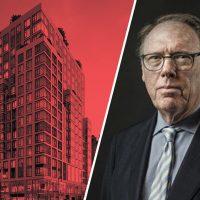This might not seem like the time to build a condominium tower in Manhattan.
The city is full of unsold units. Lenders are reluctant to finance condos. And many of the city’s wealthy residents have fled.
But Josh Schuster of Silverback Development is moving forward with plans for a 35-story building at 131 East 47th Street.
“We’re contrarian and we want to focus on these counter-cyclical construction development projects,” he said.
Schuster’s hope is that much of the excess inventory in the market will be absorbed by 2022, when construction of the 183,310-square-foot tower is slated to finish.
Silverback was brought onto the project in March by Hong Kong–based Hopson Development Holdings, which purchased the site last December from Bentley Zhao’s New Empire Real Estate Group for $115 million.
The plan is the latest of several options considered for the site, which has traded hands multiple times over the years. New Empire purchased it for $81 million in 2015, and demolished four buildings to make way for a 49-story tower. But the project never got off the ground, and Town New Development later sued New Empire over allegations that the firm had failed to pay the brokerage millions in consulting and termination fees.
Designed by Ismael Leyva Architects, the Midtown East condo is to include 200 residential units, ranging from studios to two bedrooms, and 5,000 square feet of ground-level retail. The developers have estimated the project will cost $250 million, including the price of the land. Construction is set to begin in August.
Read more


No offering plan has been filed to the attorney general’s office, but Schuster said the average price per unit will be about $1.5 million. The developers are in advanced talks with CORE about marketing the building.
But the location, which is better known as a commercial hub than a residential neighborhood, may pose challenges. According to a PincusCo analysis of New York residential buildings that are less than 50 percent sold, there are two buildings in Midtown East with a combined $321 million worth of unsold units, and one building in Midtown West that has $1.38 billion in unsold inventory. The Centrale, an 800-foot condo at nearby East 50th Street, secured a $350 million inventory loan in February, right before the pandemic hit.
Schuster, however, is betting there will be demand for his units, which he said will be modest in size and price. The glut of unsold inventory, he noted, is largely priced above $5 million. Furthermore, he aims to target current renters whose mortgage payments would be close to what they are paying to rent.
Manhattan condo projects are always a gamble, but the pandemic has made the fickle market even harder to predict. Asked about Schuster’s view that existing inventory will be largely absorbed within two years, appraiser Jonathan Miller of Miller Samuel said that by his calculation, the inventory load at the end of 2022 would take an estimated 4.3 years to sell — down from 8.7 years at the end of this year.
“The challenge is we’re assuming we know how many units are coming on in 2022, and how many are going to be sold, but those are constantly changing,” Miller said. “Who would have foreseen a global pandemic, right?”
The unpredictable climate has also created problems with financing, as lenders take a dim view of condo projects. Schuster acknowledged it had made it more difficult for them to get suitable construction financing.
“Many of the household-name condo lenders have too much exposure on the books for ground-up, for-sale products,” he said. “The list of potential candidates has shrunk drastically.”
He said the Silverback-Hopson deal is well equitized, and the developers are not seeking a high loan-to-value ratio. (Schuster declined to comment on how much money his firm has in the deal, but a representative said in an email that the firm has a “promote” arrangement with its equity partner, meaning Silverback will make money on sales over a certain threshold, with a completion guarantee attached.)
While the developers have had some offers for financing, Schuster said, they are now weighing whether to pause the search until the fall or continue in the current climate, when money is more expensive.
“If you went out for this loan, pre-Covid, you’d probably be 100 to 200 basis points cheaper,” Schuster said. “I often joke that condo has turned into a four-letter word,” he added.
Indeed, many condo projects have come up against financing roadblocks since the pandemic hit.
Art Hooper, the president of Ceruzzi Properties, told The Real Deal last month that a financing deal with Slate Property Group for Ceruzzi’s Hayworth condominium had stalled when the state shut down. A financing deal for Sharif El-Gamal’s beleaguered 45 Park Place condo is also in limbo. Other developers have begun offering bulk packages of discounted units as they struggle to offload inventory.
Even before the pandemic, some developers backed out of the market altogether. A spokesperson for Madison Equities and Gemdale Properties told TRD in January that they had hit pause on their condo development at 45 Broad Street because of “market conditions.” If built, the project will also be 80 feet shorter than planned, they said.
For Hopson Development Holdings, the East 47th Street project is the firm’s first in the U.S.
In announcing it last year on the Hong Kong Stock Exchange, the company said New York’s status as an international financial center with a growing population was a driver for the investment. But in fact, the number of New Yorkers ebbed in 2017 and 2018, and more than 400,000 have left during the pandemic. It is unclear how many will return, and when.
Still, Schuster professed confidence that Manhattan will always be a draw.
“New York City is resilient,” he said. “I don’t think this is the end of metropolitan life.”
Write to Sylvia Varnham O’Regan at so@therealdeal.com
